
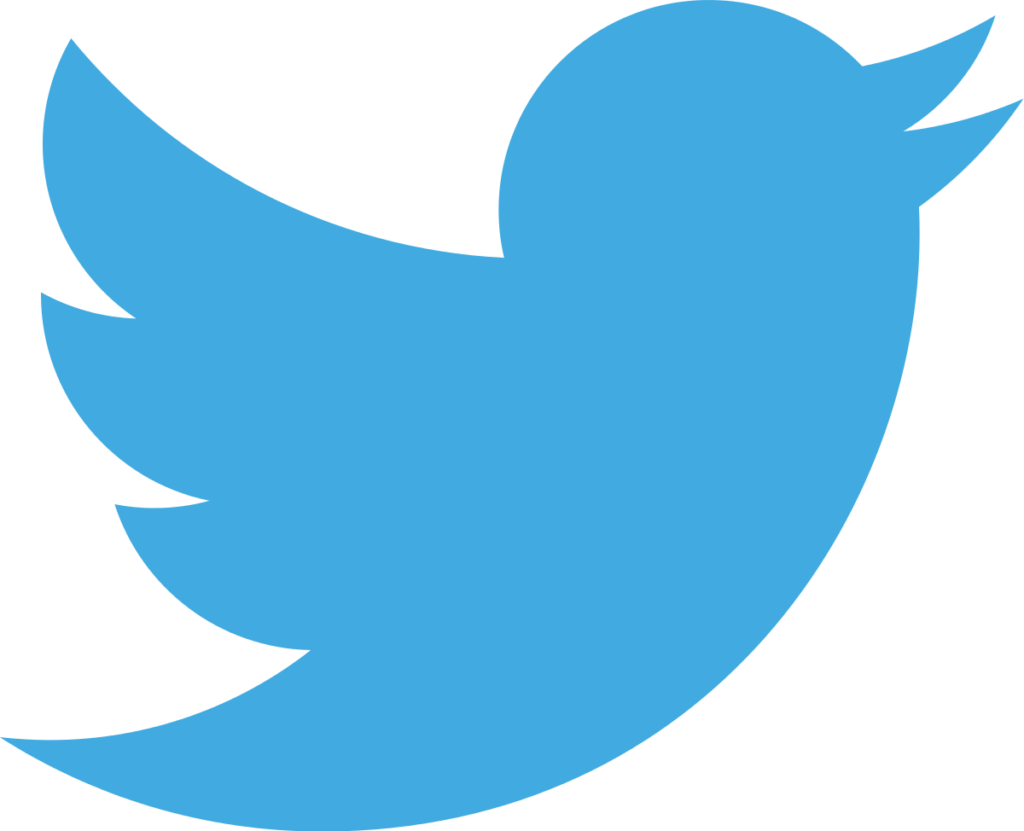
by John Helmer, Moscow
@bears_with
“We have overcome the situation when certain powers in the government were essentially usurped by oligarch clans,” President Vladimir Putin told the Federal Assembly last week. About the overcoming part, his staff aren’t so sure.
The week before, when asked to identify the guest list at Putin’s annual Christmas reception for the oligarchs on December 25, the president’s spokesman would not acknowledge there was a list, and refused to explain why it hasn’t been published. Publishing the list has been the Kremlin practice since the Christmas-for-oligarch suppers first began five years ago, on December 19, 2014.
In those five years, the President’s efforts to persuade the oligarchs to “de-offshorize” their capital, and repatriate it for reinvestment in Russia, have failed. Follow the details here. The US sanctions against those whom the US Office of Foreign Assets Control (OFAC) has judged to be closest to Putin, along with the US Treasury attack on Russian capital throughout the European banking system, have been more effective to that end. This may be the reason that, not having been overcome, the oligarchs and Putin have agreed that when they keep each other company, it will remain a state secret.
Secret at least from Russians, not from westerners. Between last month’s event and the start this week of the World Economic Forum (WEF) conference in Davos, Switzerland, the oligarchs have been busy advertising themselves in the foreign press. Their message is that they haven’t been overcome, not by the Kremlin and not by OFAC, so it’s back to business as usual.
As usual, the Financial Times is reporting this with the same fervor as has been filling the FT’s coffers and browning the noses of the FT’s Moscow Bureau for almost a quarter of a century. Regime change in the Kremlin, the Japanese-owned London outlet keeps hoping, is still best left to the oligarchs to arrange.
The latest edition of the World Economic Forum (WEF) Global Risks Report, the purported agenda for the conference this week, ignores almost entirely the economic warfare the US has launched against Russia through sanctions; the US trade war against China; and the active wars the US is waging against Afghanistan, Syria, Iran, Iraq, Libya, and Venezuela.
There is no reference to sanctions in the 71-page Davos document; nor to Afghanistan, Syria, Iran, Iraq, Libya or Venezuela. At US insistence, the WEF organizers have officially invited the US candidate for regime change in Venezuela, Juan Guaido, to attend the Davos meetings. US Secretary of State Michael Pompeo has announced he will be meeting Guaido there.
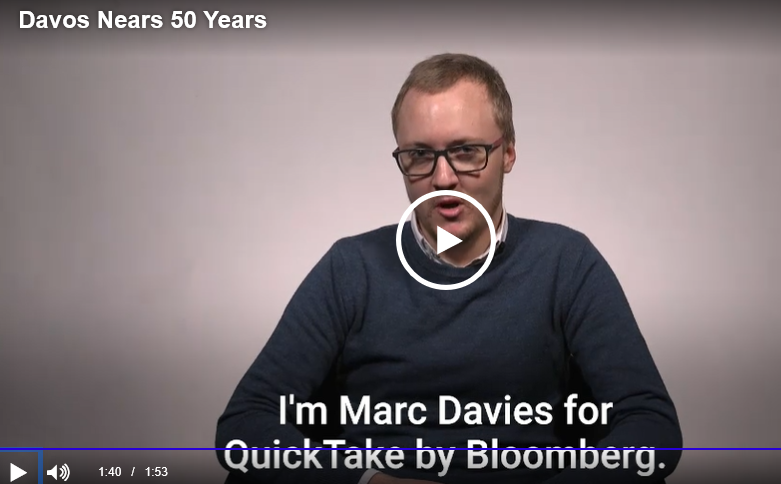
Source: https://www.bloomberg.com/ The Bloomberg reporter disclosed that attendance at Davos is by “invitation only” but didn’t mention Guaido. US sanctions prevent the Venezuelan oil company PDVSA from attending. In the fifty years of Davos meetings, Guaido is the first putschist to be presented by the US for endorsement to try again by the international business community. The WEF board of trustees, which also endorsed Guaido’s invitation, includes American investment fund figures, Laurence Fink of Blackrock and David Rubenstein of Carlyle; and Chrystia Freeland, the Ukrainian-Canadian journalist who is currently deputy prime minister in Ottawa.
There are two mentions of Russia as a geopolitical risk, none for the US, which is treated in the report as security against Russian and Chinese risk. “A new cold war is developing,” claims the Davos document, which has been written by the WEF secretariat, Marsh & McLennan, Zurich Insurance Group, and consultants at the University of Singapore, Oxford, and the Wharton School at the University of Pennsylvania.
“Countries—including China, Norway, Russia and the United States— compete for fish, gas and other natural resources; for the use of new shipping lanes; and to establish a strategic footprint in the region.” The report reports the reassurance that “the U.S. Department of Defense released its Arctic strategy in July; that document did not mention climate change but did present a strategy in which the ‘end-state for the Arctic is a secure and stable region in which U.S. national security interests are safeguarded.’”
The second Russian risk, according to the Davos report, is on the artificial intelligence (AI) front: “Despite the need for a common set of global protocols, AI has become a new frontier for competitive geopolitics. In 2017, Russian President Vladimir Putin said, ‘Whoever becomes the leader in this sphere will become the ruler of the world.’ China has strongly encouraged companies to invest in AI, making it a national security priority; AI is a pillar of its current five-year plan (2016–2020) for science and technology development and its ‘made in China 2025’ industrial plan. In the United States, the Defense Department’s Joint Artificial Intelligence Center recently requested that its budget be tripled to US$268 million, citing the rapid development of AI capabilities by China and Russia as a reason for urgency.”
The newly elected British Prime Minister Boris Johnson has turned his invitation down, and will be boycotting the Davos events this year to demonstrate to voters that “our focus is on delivering for the people, not champagne with billionaires.” In his place, the state outlet BBC is reporting that those who attend “will want to stop the rot in the way the world cooperates.” The BBC will not interview Russian officials or businessmen.
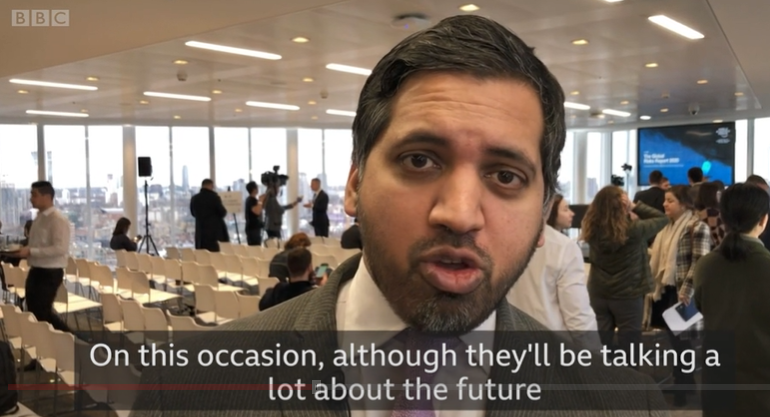
Source: https://www.bbc.com/
The Russians who have told Tass, the state news agency, they have been invited and will be in Davos this week are Oleg Deripaska (lead image, right) and Victor Vekselberg, who have been sanctioned by the US; Alexei Mordashov (lead image, centre) of Severstal and Power Machines, which is partially sanctioned; Arkady Volozh of Yandex; and Alisher Usmanov (lead image, left).
Deripaska has managed to lift sanctions on his aluminium group Rusal, but he’s still forbidden to open the front-doors of his homes in New York City and Washington, DC. Vekselberg has failed in a court bid to stop a British bank which owes him money from using the US sanctions as excuse for refusing to repay him. Boris Rotenberg, who with brother Arkady is personally closer to Putin than Vekselberg, recently lost a case in the Finnish courts to lift the secondary sanctions against Rotenberg company bank accounts in Finland.
Deripaska, Vekselberg, Mordashov and Usmanov have been at every one of Putin’s Christmas suppers since 2014; Volozh since 2015. Neither Arkady nor Boris Rotenberg has ever attended the Kremlin supper.
“For the first time in several years”, reported Tass last month, the affair was “held in an atmosphere of high secrecy. None of the 60 invited, including state bankers, top managers of state corporations, owners of large companies and officials — from the head of the Central Bank Elvira Nabiullina to the Assistant to the President Andrei Belousov – has said a word about the content of the conversation behind closed doors.” Nabiullina and Belousov are regulars at Putin’s end of the table.
Here is the last published Kremlin guest list from December 2018.
Alexander Shokhin, head of the Russian Union of Industrialists and Entrepreneurs (RUIE), who is also hired directly by the oligarchs, told the press there was to be disclosure of the substance of the meeting. He knew that to be false. His organization also refused a request to identify the guest list.
Andrei Kolesnikov, a reporter who has played Kremlin jester for years and is employed by Kommersant, an Usmanov property, was on top of the clichés of the occasion. It “was crowded, as always on such occasions. It seemed that all these people had even missed each other for a year. Although, of course, I was aware that this impression was deceptive.”
Kolesnikov’s list of attendees were: Mikhail Prokhorov; Vladimir Potanin (Norilsk Nickel), Musa Bazhaev (Alliance Oil, Russian Platinum); Mikhail Gutseriev (Russneft); Alexei Miller (Gazprom); Alexander Dyukov (Gazprom Neft); and Andrei Guriev (PhosAgro). They have all been at the same table for years.
Kommersant’s display of photographs of those present failed to detect new invitees, but it did reveal the most important of those appearing for the first time in years — Mikhail Fridman, head of Alfa Bank, X5 supermarkets, Vimpelcom telephones and the A1 group. Fridman has lived and worked in London, as do his partners Pyotr Aven and German Khan; they have deputized for Fridman at the Christmas event since 2014. Not one of the three appeared in 2018. Kolesnikov missed the significance of Fridman’s long absence and his presence this time.
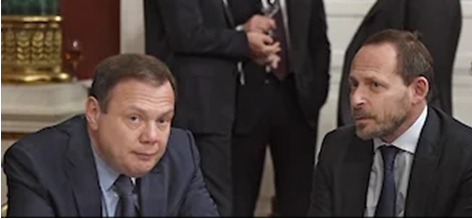
(Left to right) Mikhail Fridman and Arkady Golozh. Both were missing in December 2018. Source: https://www.kommersant.ru/
In the presence of big money Kolesnikov can be lost for words. At the FT bureau Henry Foy’s knees buckle.
Usmanov began the Davos advertising season by summoning Foy to a lunch at a “luxury spa hotel in the Bavarian Alps”. They talked for two hours; Foy managed to report ten minutes’ worth. They also ate sausages, duck, lake fish, pickled cabbage, pork knuckles, and Kaiserschmarrn (sweet pancakes), washed down with beer, vodka, and tea.
The FT has been a particular form of advertising for Fridman, who has bought the Lunch space twice, and for Aven, who has advertised the interior decoration of his London home and art collection. Usmanov has been less favoured. Reluctance of London market regulators to allow him to expand into the British steel market or list shares of his Metalloinvest holding; and a US lawsuit by DeBeers charging Usmanov with palming a Russian diamond mine have been disincentives in the past.
Foy hasn’t forgiven and forgotten; he didn’t know. And so he didn’t ask about Usmanov’s troubles with Goldman Sachs in the listing of his Megafon shares; nor mention the telephone business Usmanov did with Gulnara Karimova, the corrupt Uzbek businesswoman.
“My biggest textbook in western business was the FT,” Usmanov told Foy for softeners. Foy replied by asking if Usmanov is afraid of US sanctions. “How can I be scared of sanctions when I have experienced things in life that were much more severe. I don’t deserve them if they come, so it will be hurtful if they come…I don’t get involved. I don’t interfere in any political issues.”
Foy then tried the US Treasury cliché. “Are you close to Putin?” “I think he is the number one leader in the world today,” Usmanov answered. “I never had anything to do with any of these so-called special assignments. [Putin] doesn’t need anything. He doesn’t need oligarchs, just a solid state.”
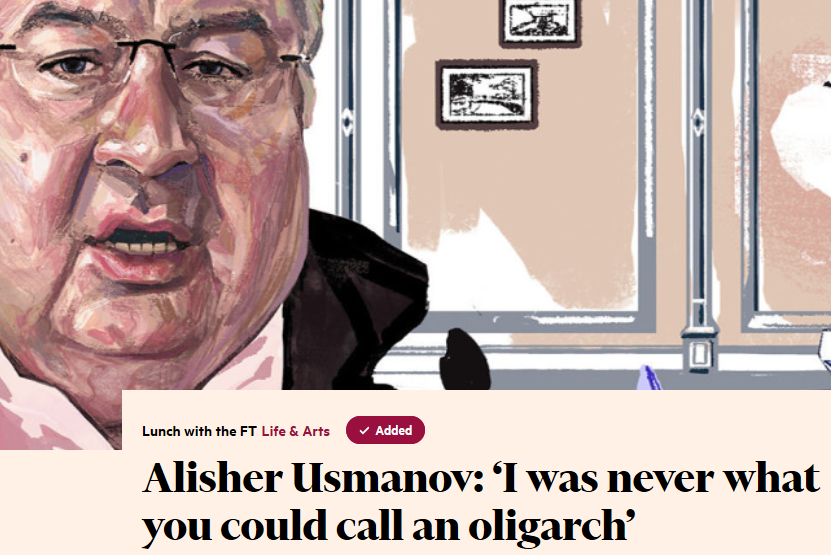
Source: https://www.ft.com/“Never in any situation was I what you could call an oligarch. All the assets my partners and I bought in Russia were from the secondary market, not in any so-called privatisation processes. No one ever gifted anything to me. But I would be indecent to say the state didn’t give me this opportunity…the state has been very co-operative and helpful and never refused us anything.”
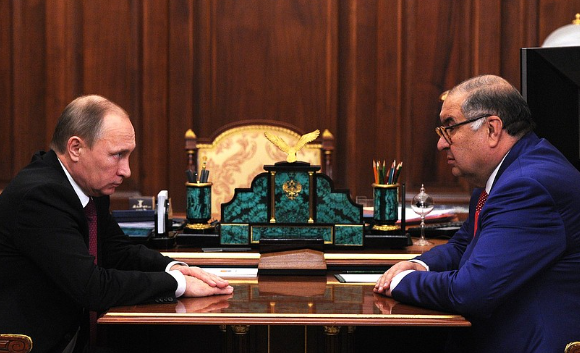
The last time Usmanov met officially with Putin was on December 10, 2015: http://en.kremlin.ru/ Because their wives are friends, they meet unofficially elsewhere.
Foy tried unbuckling his knees. “Usmanov suggests he had had enough. The table is strewn with half-eaten food and dirty crockery. As I request the bill, I ask if he enjoyed our conversation.” “No, not really”, Usmanov answered. “But I had to drink vodka with you…Without vodka, what is talking between men?”











Leave a Reply